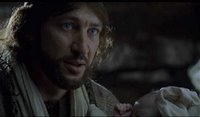Joseph of Nazareth (2000)
 Whilst the number of films about the Virgin Mary could hardly be called excessive, Joseph of Nazareth (2000) is the first film ever to make her husband the central figure. This is no doubt due to church tradition which, whilst it has honoured both Mary and Joseph, has given Mary special reverence. Interestingly, only two of the four gospels include an account of Jesus birth, and their authors choose to tell the story from differing perspectives. Luke's account places Mary at the centre of his prologue. So the narrative starts with a tale about Mary's relatives who will later take her in once Gabriel has told her of God's plan. We are given Mary's responses (immediately, and at length in the words of the Magnificat), detail about the birth where it is she who swaddles Jesus, and later ponders what has happened.
Whilst the number of films about the Virgin Mary could hardly be called excessive, Joseph of Nazareth (2000) is the first film ever to make her husband the central figure. This is no doubt due to church tradition which, whilst it has honoured both Mary and Joseph, has given Mary special reverence. Interestingly, only two of the four gospels include an account of Jesus birth, and their authors choose to tell the story from differing perspectives. Luke's account places Mary at the centre of his prologue. So the narrative starts with a tale about Mary's relatives who will later take her in once Gabriel has told her of God's plan. We are given Mary's responses (immediately, and at length in the words of the Magnificat), detail about the birth where it is she who swaddles Jesus, and later ponders what has happened.By contrast, Matthew's account deals with the story from Joseph's perspective. The opening genealogy immediately establishes his credentials, and we are quickly assured of his righteousness. The annunciation is only implied, but Joseph receives no less than four dreams. Joseph is cast then in a heroic role, righteous, not wishing to disgrace Mary, and then cast as the active husband whose faithful and decisive actions rescue their child from peril.
 So, all in all, Joseph's chance to have a leading role is long overdue, and with thirteen bible films already under their belt, the Bible Collection clearly decided they were the people to do it, including it as part of their "Close to Jesus" series.
So, all in all, Joseph's chance to have a leading role is long overdue, and with thirteen bible films already under their belt, the Bible Collection clearly decided they were the people to do it, including it as part of their "Close to Jesus" series. Like many of the Bible Collection films, Joseph of Nazareth fuses the biblical narratives with fictional exposition, quotations from other passages of the bible, and relevant extra-biblical history. The latter, as elsewhere, is presented in compressed form, so the deaths of Herod's conspiring sons, occurs at the same time as Mary's pregnancy whereas in reality these events unfolded over a five year period some time before a likely date for Jesus's birth.
Unlike many of the other Bible Collection films, however, it avoids turning the relationship between Mary and Joseph into some kind of soap opera romance, a smart move which enables deeper emotions to surface. Sadly, other aspects of the film do not fair so well. Joseph just happens to be the best carpenter in the nation, so much so that he is hauled off to do some woodwork for Herod at the same moment the angel is appearing to Mary. The scene where Joseph haggles with a despicable innkeeper is simply terrible. Furthermore, at the moment of Jesus's birth, Joseph just happens to have popped out to collect some firewood. Then there is Joseph dashing over the rocks with baby Jesus to escape one of Herod's soldiers. Fortunately, the soldier in question proves to be a cross between Gollum and Buster Keaton and falls to his death chasing after a ornate necklace Joseph just happened to have to hand. Finally, the incident where Jesus as a boy is left at the temple proves to be so stressful that it leads to Joseph's death, although this may be just his disappointment that the Son of God turns out to be so annoying.
 Added to this is the uneven acting, which is embodied, in particular, in Tobias Moretti's portrayal of Joseph. Moretti absolutely nails some scenes yet seems to flounder in others. Stefania Rivi's Mary is perhaps the best overall performance in the film, but there are far too many at the other end of the scale. Worst of all is the role of Herod's seer, who turns in what is possibly the hammiest performance in any biblical film. It doesn't help that as he is led away to be executed Herod's sycophantic courtiers re-enact the laughing scene from Austin Powers.
Added to this is the uneven acting, which is embodied, in particular, in Tobias Moretti's portrayal of Joseph. Moretti absolutely nails some scenes yet seems to flounder in others. Stefania Rivi's Mary is perhaps the best overall performance in the film, but there are far too many at the other end of the scale. Worst of all is the role of Herod's seer, who turns in what is possibly the hammiest performance in any biblical film. It doesn't help that as he is led away to be executed Herod's sycophantic courtiers re-enact the laughing scene from Austin Powers.One of the issues that is often discussed surrounding the nativity story is that of Mary's perpetual virginity. Orthodox and Roman Catholic believers hold that those listed in Matt 13:55 were either Jesus's cousins, or Joseph's children from an earlier marriage. The film dabbles in these traditions, but ultimately seems to dismiss them. In the opening scenes Joseph reveals he had previously been betrothed, but tragedy struck before he had married. Similarly, we are introduced to Joses, Simon and Judas, who are Joseph's nephews, but Judas and Joses are killed before the end of the film. Simon survives, but there is no mention of Jesus's sisters, nor the most important of his relations, James, who went on to lead the early church. It's a strange position to adopt, seemingly leaving Protestant, Catholic and Orthodox Christians all unsatisfied.
 It's not all bad however, the opening scenes, and those of the betrothal and the annunciation are believably and sensitively realised. At 37, Joseph considers himself too old for this young Mary, agreeing to marry her more as a favour to her father than anything else. Yet the film makes their relationship believable. There is plenty of love, but not necessarily romantic or sexual love. Joseph is part father figure, part husband, part friend, and part co-parent. It's a complex relationship, and given the very low regards which our culture has for arranged marriages, it would have been far easier for the film to opt simply for a romance driven relationship. Yet it is to the film's credit that it manages such sympathetic depiction of this relationship. It's just a shame that the strength shown in this aspect is marred by so many weaknesses elsewhere.
It's not all bad however, the opening scenes, and those of the betrothal and the annunciation are believably and sensitively realised. At 37, Joseph considers himself too old for this young Mary, agreeing to marry her more as a favour to her father than anything else. Yet the film makes their relationship believable. There is plenty of love, but not necessarily romantic or sexual love. Joseph is part father figure, part husband, part friend, and part co-parent. It's a complex relationship, and given the very low regards which our culture has for arranged marriages, it would have been far easier for the film to opt simply for a romance driven relationship. Yet it is to the film's credit that it manages such sympathetic depiction of this relationship. It's just a shame that the strength shown in this aspect is marred by so many weaknesses elsewhere.Labels: Bible Collection (The), Close to Jesus Series, Joseph of Nazareth, Nativity - Mary Joseph














0 Comments:
Post a Comment
<< Home